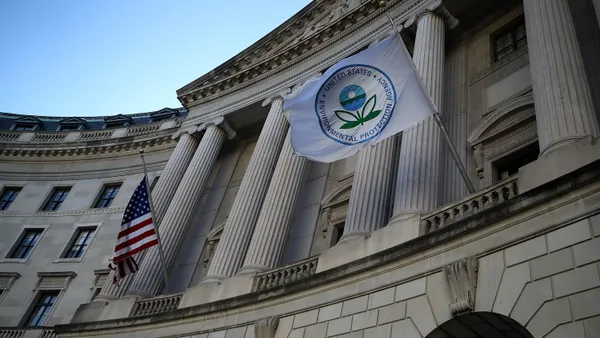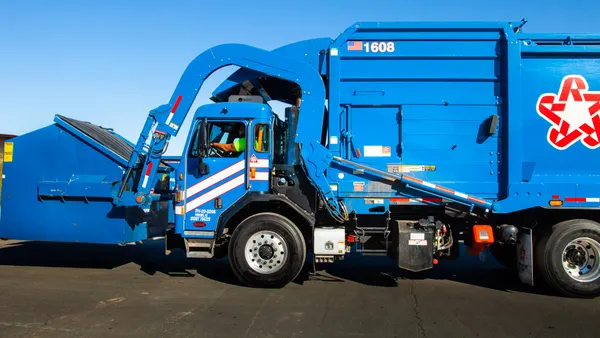Puerto Rico’s landfills were beyond capacity years before Hurricane Maria hit the U.S. territory on Sept. 20. The unimaginable debris and garbage generated by the storm will exacerbate those conditions, potentially overwhelming waste management operations.
The quantifiable damage paints a bleak picture for the immediate future of the island. With the Puerto Rican government reporting that only 16% of the island has power and only 53% of the island has any sort of telecommunication service, there are still many unknowns.
All 78 municipalities in Puerto Rico have experienced disruption in their waste collection services, according to David Biderman, CEO of the Solid Waste Association of North America (SWANA). Additionally, Biderman said that SWANA members in Puerto Rico have told him San Juan, the territory's capital, has experienced some flooding because of "green waste and debris clogging storm sewers."
Dania Rodriguez, the executive director of The Association of State and Territorial Solid Waste Management Officials, told Waste Dive that she had only been able to contact association members in Puerto Rico once in two weeks following the storm, and was unable to offer additional information.
While so much of the island remains cut off, there is one demonstrable fact: The men and women of the waste industry are stepping up to offer aid and comfort.
Aid and supplies
As Hurricane Maria moved away from Puerto Rico, it wasn't long before Waste Management took to Twitter to highlight the work the company was doing.
We've landed in Puerto Rico with medical supplies and other needed items. #UnitedforPuertoRico pic.twitter.com/XdKcs2TISy
— Waste Management (@WasteManagement) September 29, 2017
Waste Management CEO Jim Fish lent one of the company's private planes to deliver medical supplies to Puerto Rico. According to Toni Beck, vice president of communications and community relations, the flight into Puerto Rico had around 3,000 pounds of medical supplies.
"It really ran the gamut," Beck said in an interview. "Insulin, dialysis fluid, they had a whole bunch of pediatric medication." Waste Management has no direct operations in Puerto Rico.
Additionally, Beck said, Waste Management donated $1 million to the American Red Cross after Hurricane Irma (which scraped Puerto Rico before Maria made landfall). Waste Management also donated $3 million to groups including the American Red Cross and Mayor Sylvester Turner's Hurricane Relief Fund after Hurricane Harvey.
The New York City Department of Sanitation (DSNY) announced Friday that it had sent 31 employees to Puerto Rico to assist with and coordinate debris clearance and disposal operations. According to the announcement, the group expects to remain on the island for about two weeks.
'I only have a week'
A group of 77 Teamsters members from across the country departed for Puerto Rico Oct. 4 from Newark, NJ, in a flight sponsored by United Airlines. The flight carried volunteers from other groups and carried supplies, as well.
For two Teamsters who Waste Dive spoke with, the mission in Puerto Rico is personal.
"My godmother, being Puerto Rican, she was basically crying all the time because she couldn't communicate with [anyone on the island]," Jessica Yance, a crane operator at Sims Municipal Recycling in New York City and a member of Teamsters Local 210, said. "It really broke my heart."
While she hadn't gotten her personal assignment yet, Yance said she was pretty sure that she’d either be moving material, like debris, around with heavy equipment or doing demolition work, because of her experience as a crane operator. She said that as a Hispanic woman, it was a "quick yes" for her to take the opportunity to travel to the island.
"It kind of hit me hard," she said. "The Latino community is really strong where I live."
"No task is too small. I'm only there for a week, so I have to do as much as I can in seven days."

Bonacio Crespi
Driver, M&M Sanitation Services
Bonacio Crespi, a driver for M&M Sanitation Services in New York City and a member of Teamsters Local 813, said he had family on the island that he couldn't get in touch with for the first few days after the storm.
"Our family was actually putting together money for one of my aunts, because her house totally collapsed," he said. "But it doesn’t do any good, because there's no power, you can't transfer money electronically. It's a total mess."
Crespi said he was expecting to work 12 hour shifts of "grunt work."
"No task is too small," Crespi said. "I'm only there for a week, so I have to do as much as I can in seven days."
Both Yance and Crespi said that their families and friends in Puerto Rico were accounted for.
"Material things can be replaced," Crespi said. "We're not stressed about that...luckily everyone is accounted for. People went through a lot of hardships, it's tragic."








